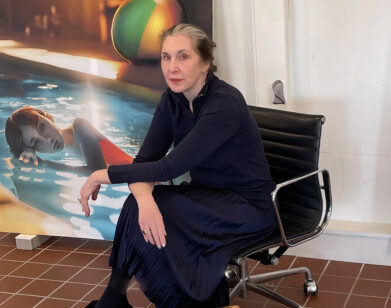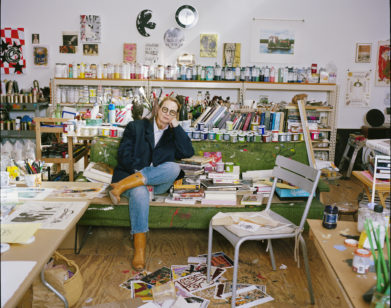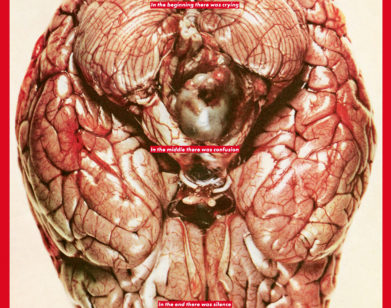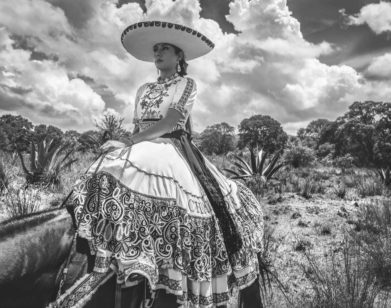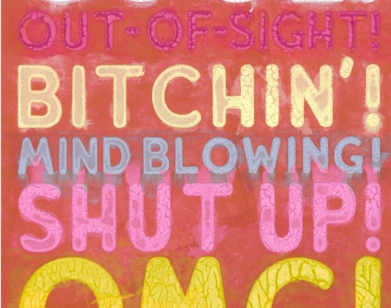Rowan Blanchard, Solange Knowles, Barbara Kruger, and more on being a woman
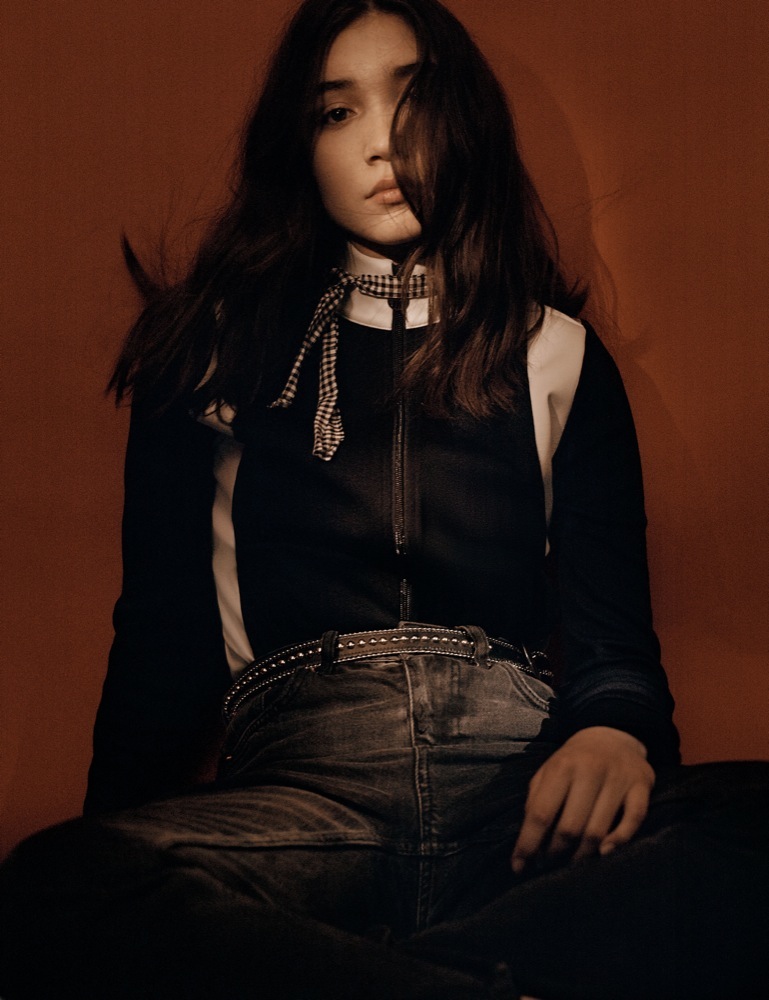
Ideally, every day would be women’s day, but such is not the case. What started out in the beginning of the 20th century as scattered protests throughout the world has evolved into an internationally recognized day by the United Nations in 1975— and while it might mean different things to different people, it seems that if we need a designated day to recognize the existence, never mind the achievements, of half the world’s population, there’s still a lot of work to be done.
Proper healthcare, fair pay, real honest-to-god sexual liberation, and equal representation in industries from arts to politics, to skilled trade work are just a smidgen of the issues we need before a woman can truly feel free to speak her mind without fear of being denigrated. Luckily, a lot of women know that and they’re acting and they’re talking and they’re mobilizing, and to celebrate those women, we rounded up quotes from some of the iconic lady writers, musicians, artists, international relations specialists featured in Interview throughout the years.
Rowan Blanchard, March 2016: “No girl should feel scared to be friends with other females. I was. I lived in fear of other girls. I remember saying, in seventh or eighth grade, “I only hang out with boys, because girls are really scary and mean.” Because of this whole image of perfection in friends groups, I was really scared that other girls hated me, that I wasn’t pretty enough or cool enough or I didn’t have enough Instagram followers or whatever. But finding female friendship was such a monumental point in my life. And I never want somebody to feel like they have to re-evaluate themselves to join my friends or to join any friend-group.”
Guerilla Girls, February 2012: “It’s always been two steps forward, one step back, but feminism is changing women’s lives around the globe—very, very slowly in most places, and significantly in others. Even the most repressive countries have feminist movements—brave women often working in secret. By the way, we think it’s ridiculous that so many people in the U.S. who believe in the tenets of feminism, equal pay for equal work, freedom from sexual exploitation and abuse, the right to an education, control over their reproductive lives, etc., have been brainwashed by negative stereotypes in the media and society and refuse to call themselves feminists. And guys, that means you, too. Time to man up, whether you’re female, male, trans, etc. and speak up for women. Feminism don’t get no respect, but women’s rights, civil rights, and gay, lesbian and trans rights are the great human rights movements of our time.”
Uma Thurman, October 1992: “Women are always at war with their role of being attractive and sexy. On a big level. Professional women are at war with the idea of being given a job because they’re nice to look at! Secretaries, businesswomen, lawyers, all women…. [Actresses] are trying to pursue what they like to do around the obstacle of women having to carry the sexual burden in movies. It amuses me that women are always asked about doing nudity in films, or sex in films, or even being sexual in films, and men aren’t…. A lot of actors who have been in very commercial, sexy movies, are not perceived as being sexually exploitative, but their movies make a lot of money and their price goes up. There’s a strange exchange going on.”
Nuha Alhegelan, Saudi Arabian ambassador to the U.S., February 1980: “I [wear a veil] because I like feeling a part of a whole society. I just cover my head. I don’t veil my face. You see the whole way of looking at it is totally different. Because here the average woman … If you tell her that women are veiled in certain countries, she would say: ‘Oh, how humiliating!’ But, if you ask a lady from Saudia Arabia, ‘Why don’t you unveil?’, she would say: ‘Oh, how humiliating!’ It’s a totally different point of view … I am a feminist in my way, but, I’m not very militant. Let’s face it. I’m a feminist, meaning, that women should have their equal rights in front of the law. But, to become a man, I don’t want to become a man. I really resent it. And, I don’t think we are getting anywhere that way.”
Solange Knowles, January 2017: “And, as far back as I can remember, our mother always taught us to be in control of our voice and our bodies and our work, and she showed us that through her example. If she conjured up an idea, there was not one element of that idea that she was not going to have her hand in. She was not going to hand that over to someone. And I think it’s been an interesting thing to navigate, especially watching you do the same in all aspects of your work: Society labels that a control freak, an obsessive woman, or someone who has an inability to trust her team or to empower other people to do the work, which is completely untrue. There’s no way to succeed without having a team and all of the moving parts that help bring it into life. But I do have—and I’m unafraid to say it—a very distinctive, clear vision of how I want to present myself and my body and my voice and my perspective. And who better to really tell that story than yourself?”
Laurie Simmons, March 2014: “…When I picked up a camera with a group of other women, I’m not gonna say it was a radical act, but we were certainly doing it in some sort of defiance of, or reaction to, a male-dominated world of painting. This was before the internet, before photographs on Instagram and online in magazines and newspapers.”
Barbara Kruger, February 2013: “I never say I do political art. Nor do I do feminist art. I’m a woman who’s a feminist, who makes art. But I think what becomes visible and what work remains absent is always the result of historical circumstance.”
Yoko Ono, March 2011: “We stood up for feminism and all that, and it came to a point that we were attacked so much that women got very intimidated and said, ‘No, I’m not a feminist, no, I think feminism is bad.’ There’s nothing bad about feminism. We have to help each other, because there’s a lot of women in the world who are suffering because the fact is we’re not equal. It’s as plain as that. It’s still a man’s world.”
Zadie Smith, March 2012: “I notice when women go to teach at university, they dress very severely. You have to bring something added to establish your credentials; whereas any old guy can walk into a classroom, particularly if he has a beard, and people will assume genius. This affects the literary world, too. You have this sense that women’s matters are not serious. I remember one year a Booker judge saying, ‘Oh, these books are too domestic,’ and the judge held up my book as an example of a book that wasn’t domestic, thinking that was a compliment. But I don’t consider that a compliment—to have a women’s field, if that’s what it is, denigrated.”
Geena Davis, March 1992: “[On a League of Their Own] The chance, for a woman, to play a baseball player was a once-in-a-lifetime thing. It would be like if I got offered a movie to be a cowboy or something—it just wouldn’t happen! A movie where I’m, like, this incredible jock, heroic, star baseball player is kind of a weird aberration, but I like to do interesting, challenging stuff. And I like to do parts where women get to do cool stuff.”


